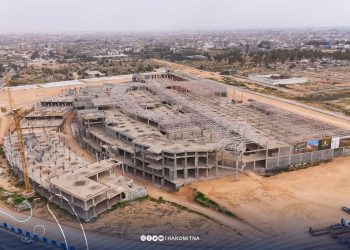Libya’s Undersecretary of the Ministry of Health for Medical Centres Affairs, Tawfiq Al-Darsi, discusses with representatives of international Japanese companies the provision of the latest treatment devices for oncology patients.
The discussions took place last Thursday at the Health Ministry’s Tripoli headquarters when the Undersecretary received representatives of several international Japanese companies specialized in the field of manufacturing medicines and medical devices.
The two sides discussed ways of cooperation in the presence of Counsellor Saleh Abu Khurais Kaza, representing the General Federation of Chambers of Commerce, Industry, and agriculture in Libya.
The Undersecretary discussed with the delegation the mechanisms of cooperation in providing the latest therapeutic devices for oncology patients using radioactive material technologies, which can attack cancer cells while maintaining the integrity of muscle and tissue mass inside the patient’s body.
Libyan experts to visit Japan
During the meeting, it was agreed to send a team of experts and consultants specialized in treating oncology patients and well-versed in technology in Libya to Japan, to evaluate the devices and ensure that they conform to the required specifications on the one hand, that they work well and that they include all the required accessories.
The Undersecretary discussed with the Japanese delegation ways of cooperation in the field of supplying specialized medicines, especially those related to the treatment of oncology and neurology patients.
He indicated the Ministry’s keenness to deal with international Japanese companies that manufacture medicines, given the Japanese pharmaceutical market’s characteristics of manufacturing high-quality pharmaceutical drugs and its commitment to the highest standards of quality assurance and quality control worldwide.
Japanese engineers to repair equipment in Libya
In a related context, the Undersecretary discussed with the delegation sending teams of Japanese engineers to repair the malfunctions of the durable Japanese medical devices previously supplied by the Ministry of Health to public and educational hospitals and specialized medical centers. They are to detect the causes of the malfunctions and make sure that the damaged parts are changed to repair the fault, and then check the safety, in addition to training engineers in health facilities to perform periodic maintenance of the devices.
To develop treatment services for dialysis patients
Finally, the Undersecretary discussed with the delegation ways to develop treatment services for dialysis patients, by taking advantage of the technologies offered by home and mobile dialysis devices.
This is to be done with the aim of achieving flexibility for patients undergoing dialysis, as well as physicians, by integrating all treatment systems from care with the help of a nurse, self-care, right up to dialysis at home.










